Buros-Nebraska Series on Measurement and Testing

The Influence of Cognitive Psychology on Testing
Date of this Version
1987
Document Type
Article
Citation
From The Influence of Cognitive Psychology on Testing, edited by Royce R. Ronning, John A. Glover, Jane C. Conoley, and Joseph C. Witt (Hillsdale, NJ: Lawrence Erlbaum Associates, 1987)
Abstract
One of the goals of psychology has always been to describe, understand, and measure individual differences. The diversity of human behavior makes it particularly challenging to seek to identify general and stable underlying elements that correspond to systematic individual differences . A major problem in the efforts to identify such elements is that the elements cannot be observed directly. The primary method has been to use the current psychological theory to develop procedures to measure such hypothetical elements. In this chapter I present a new theoretic framework, based on verbal reports from subjects, for identifying and measuring individual differences. I argue that this framework is superior to the previous ones; hence, I briefly review some of the earlier approaches to measurement of individual differences.
When scientific psychology was first established over 100 years ago , the predominant method of investigation consisted of eliciting introspective verbal reports from trained observers. During the introspective era, the research was directed toward uncovering the basic sensations and cognitive processes that provided the building blocks of the varied and complex human experiences. Within this theoretical perspective, it was assumed that observable individual differences in normal cognitive functioning were a consequence of differences in basic cognitive processes. It was furthermore assumed that individual differences in performance on simple tasks, like simple reaction time, letter cancellation, and sensory discrimination, would directly reflect individual differences in the corresponding basic processes. However, the first studies of individual differences on simple tasks showed disappointingly low correlations among tasks as well as to grades in school and other indices of ability (Guilford , 1967).
Particularly damaging for this view of simple tasks reflecting basic processes was the finding that substantial improvement in performance was observed with practice (Binet cited in Varon , 1935). Although subsequent successful attempts to measure intelligence reliably relied almost exclusively on complex tasks involving comprehension, the view that individual differences are due to differences in basic processes was never completely discarded. Exceptional ability (exceptional memory) was consistently interpreted as a result of differences in such basic processes.
The behavioristic era had interesting implications for measurement, in that a theory of cognitive structures was explicitly rejected. Among extreme behaviorists, all individual differences were attributed to differences in learning, or exposure to relevant experiences. Hence, measurement of basic cognitive functions would be meaningless. The measurement of individual differences in complex tasks had to be conducted in an inductive mode, where stable patterns of individual differences were discovered empirically rather than deduced theoretically. Lacking a cognitive theory, a general theory of measurement was developed and refined through the years. This theory of measurement was incorporated as an integral part of the methodology of experimental psychology. A central problem with the behavioristic approach was to understand what the observed performance on a test actually measures.


Comments
Copyright © 1987 Lawrence Erlbaum Associates, Inc. Digital Edition Copyright © 2012 Buros Center for Testing.